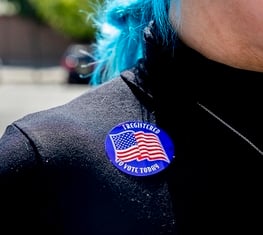Blog
On May 16, 2023, Mary Roche volunteered as a poll worker in her county for Pennsylvania’s municipal primary election. She'd recently joined her local League, and by volunteering, she learned more about everything poll workers do to keep our elections running smoothly and ensure that every voice is heard.
Over one-third of the food produced in the US is never consumed — it is wasted. Food waste means all resources to grow the food are also wasted — energy, labor, water, and fertilizers. The energy loss alone is enough to power 50 million homes annually.
The Deferred Action for Childhood Arrivals (DACA) program protects certain people who immigrated to the United States as children from being deported. Since the program began in 2012, DACA has allowed more than 800,000 people to remain in the US, where they attend school, work, and raise their families as vital members of our communities.
Kristy Drutman, also known as “Browngirl Green,” is a speaker, media producer, and environmental justice activist. She co-founded the Green Jobs Board, a digital platform to help folks around the country find jobs and resources in the environmental space.
School board members have the important job of overseeing the education of future community members, and that’s powerful. The school board sets the policies and goals for the district, while the superintendent implements those policies and works toward the goals.
Voter ID laws have long been debated in the United States. While supporters argue that voter photo ID laws are necessary to prevent voter fraud and ensure the integrity of elections, reality tells a different story. Not only do these measures disproportionately impact Black, Native, elderly, and student voters, but they also fail to effectively address any real issues related to election integrity.
The League’s history of breaking down barriers to voting is perhaps best exemplified by its contribution to the passage of the National Voter Registration Act (NVRA) in 1993. This legislation makes it easier for all Americans to register to vote and maintain their registration.
LWV's legislative & policy coordinator shares her experience as a voting rights advocate in Tennessee.
The League of Women Voters became a household name in the mid-twentieth century as the award-winning sponsor of the US’s first televised presidential debates. Why did that change, and will the League ever sponsor Presidential debates again?
Civic education and involvement are key to a healthy American democracy. Included are stories from states across the country about the importance of civic engagement and the work that they are doing to promote it.
This blog highlights work in Florida, Maine, Maryland, Minnesota, and Pennsylvania.
Sign Up For Email
Keep up with the League. Receive emails to your inbox!
Donate to support our work
to empower voters and defend democracy.




